ROBERT WILLIAMS BUCHANAN (1841 - 1901)
|
ROBERT WILLIAMS BUCHANAN (1841 - 1901) |
|
|
|
|
|
|
|
|
{ Robert Buchanan: Some Account Of His Life, His Life’s Work And His Literary Friendships } |
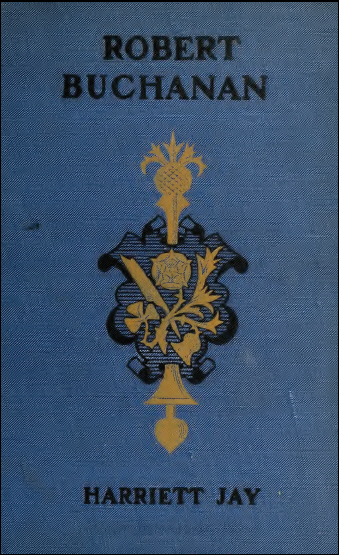 |
|||||
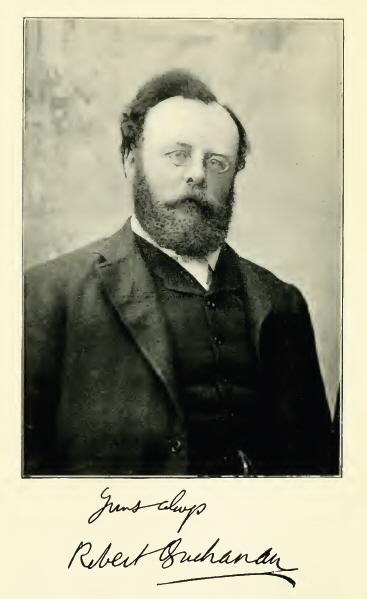 |
|||||
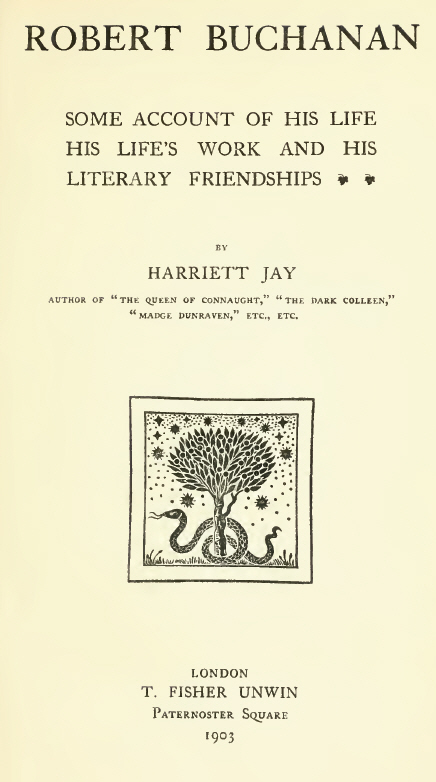 |
|||||
|
ROBERT BUCHANAN SOME ACCOUNT OF HIS LIFE HIS LIFE'S WORK AND HIS LITERARY FRIENDSHIPS BY HARRIETT JAY AUTHOR OF “THE QUEEN OF CONNAUGHT,” “THE DARK COLLEEN,” T. FISHER UNWIN PATERNOSTER SQUARE 1903 |
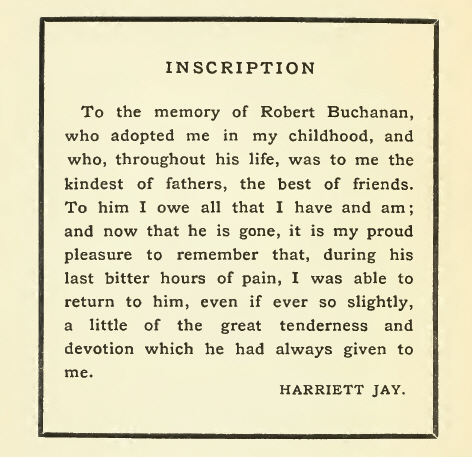 |
|||
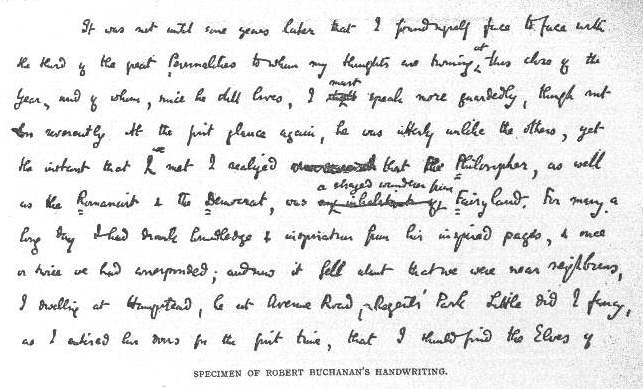 |
|||
|
vii _____
“Nobody could tell the story of his life so well as Robert Buchanan himself” (wrote Mr. T.P. O’Connor in M.A.P.), and I feel this statement to be so absolutely true that I have endeavoured in compiling these Memoirs, to allow the Poet as far as possible to speak for himself. With this object in view I have been most careful to gather together every scrap of reminiscence which he has published from time to time in various newspapers and magazines. He knew himself better than any man or woman could possibly know him, no matter how intimate their acquaintance with him might be, and so I have endeavoured to allow him to reveal himself to the world. HARRIETT JAY.
|
|
|
__________ ILLUSTRATIONS _____
PORTRAIT OF ROBERT BUCHANAN Frontispiece SPECIMEN OF ROBERT BUCHANAN’S HANDWRITING Page v ROBERT BUCHANAN (THE POET’S FATHER) To face page 8 66 STAMFORD STREET „ „ 50 MARY BUCHANAN (THE POET’S WIFE) „ „ 100 HARRIETT JAY „ „ 234 MARGARET BUCHANAN (THE POET’S MOTHER) „ „ 278 ROBERT BUCHANAN AND “BETSY” (Last Portrait) „ „ 308 THE POET’S GRAVE „ „ 312 __________
[Notes: ___ I have made one change to the original text. In the opening sentence of the first chapter, Miss Jay places Caverswall in Lancashire. Since the origin of this site was my interest in authors born in the Stoke-on-Trent area I thought she wouldn’t mind if I corrected her. The same mistake also caught the eye of at least one journalist: The Guardian (2 February, 1903 - p.4) I notice that the first sentence of the biography of Robert Buchanan, just published, and written by Miss Harriet Jay, contains a mistake as to Buchanan’s birthplace. “Robert Buchanan,” the sentence runs, “poet, novelist, dramatist, was born at Caverswall, in Lancashire, on the 18th of August, 1841.” There may be a Caverswall in Lancashire—though I never heard of one,—but the Caverswall where he was born is in Staffordshire, a few miles from Stoke-on-Trent. It boasts a moated castle, and is altogether a pretty place. Robert Buchanan’s father was a Socialist who came to the Potteries from Glasgow. He was one of the early disciples of Robert Owen, and one of the most prominent figures upon the side of the working potters in the great strike of 1836. He married the daughter of a solicitor named Williams, who was one of those who induced Robert Owen to make his second visit to the Potteries, in 1840, and who protected Owen from the mob at Burslem. Robert Owen was at the wedding of Miss Williams and Buchanan at a registry, and gave the bride away. ___ And in regard to Harriett Jay’s account of her’adoption’ by her sister Mary and Robert Buchanan in the Preface, I feel I should point out that in the 1901 census she gave her age as 38, when in fact she was 47. Although I haven’t been able to confirm the date of Buchanan’s wedding to Mary Jay, if it did occur in September 1861, he would have been 20, Mary would have been 16, and Harriett Jay would have been 8 years old. ] _____
Robert Buchanan: Some Account of His Life, His Life’s Work and His Literary Friendships can be downloaded as a zipped rtf file. It is also available at the Internet Archive in a variety of formats.
Reviews of Robert Buchanan by Harriett Jay Back to Biography, Bibliography or Harriett Jay
|
|
|
|
|
|
|